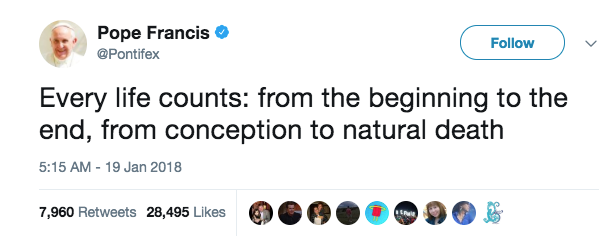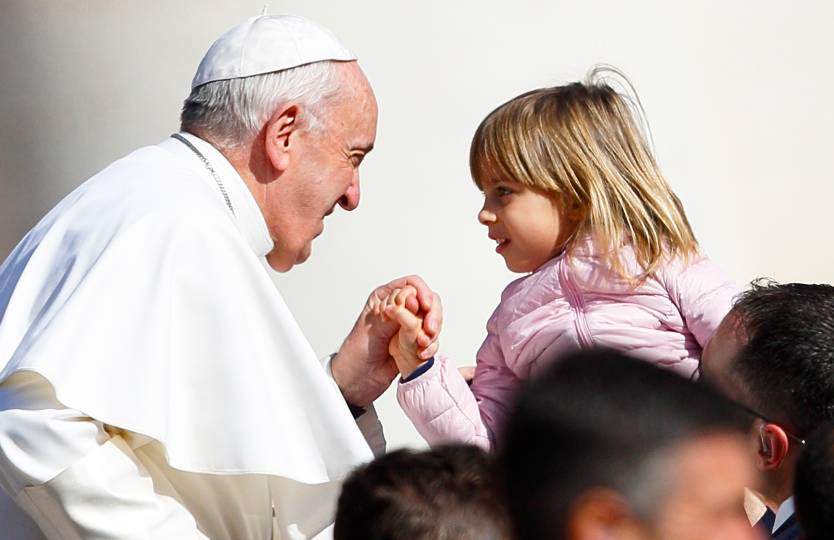Salt+Light's Top 5 Favorite Pope Francis Quotes on Pro-Life
Salt + Light Media
Thursday, May 10, 2018

-
“So great is the value of a human life, and so inalienable the right to life of an innocent child growing in the mother’s womb, that no alleged right… can justify a decision to terminate that life.” (Amoris laetitia, 83)
-
Human life must always be defended from its beginning in the womb and must be recognized as a gift of God that guarantees the future of humanity. - (Letter to Brazilian families for National Family Week, August 6, 2013)
-
“Every life counts: from the beginning to the end, from conception to natural death “ Twitter, Jan. 19 201

-
“All life has inestimable value even the weakest and most vulnerable, the sick, the old, the unborn and the poor, are masterpieces of God’s creation, made in his own image, destined to live forever, and deserving of the utmost reverence and respect.” (Message to Catholics participating in Day for Life in Britain & Ireland, July 28, 2013)
-
Our defence of the innocent unborn, for example, needs to be clear, firm and passionate, for at stake is the dignity of a human life, which is always sacred and demands love for each person, regardless of his or her stage of development. Equally sacred, however, are the lives of the poor, those already born, the destitute, the abandoned and the underprivileged, the vulnerable infirm and elderly exposed to covert euthanasia, the victims of human trafficking, new forms of slavery, and every form of rejection. (Gaudete et exsultate, 84)

Related Articles:
Category: Faith Education, Featured, General Posts, Pope Francis
Tag: Amoris Laetitia, from womb to tomb, Gaudete et exsultate, March for Life, Pope Francis Pro-Life, Top 5 Quotes
Pray with the Pope Reflection – June 2025
Friday, June 13, 2025
 Fr. Edmund Lo, SJ
Fr. Edmund Lo, SJ
In this month of June, the Holy Father invites us to pray that the world might grow in compassion, that each one of us might find consolation in a personal relationship with Jesus, and from his Heart, learn to have compassion on the world.
Chaplaincy: “Divine Coffee” for Students
Tuesday, June 10, 2025
 Gianpaolo Capozzi
Gianpaolo Capozzi
Gianpaolo gives us a behind the scenes look at his upcoming Behold segment on the York University Catholic Chaplaincy.
Pope Leo XIV’s homily for Pentecost Sunday 2025
Sunday, June 8, 2025
 Pope Leo XIV
Pope Leo XIV
On Sunday, June 8, 2025, Pope Leo XIV celebrated Mass for the Jubilee of Movements, Associations, and New Communities and spoke about how the Holy Spirit helps the apostles overcome "their fear, shatters their inner chains, heals their wounds, anoints them with strength and grants them the courage to go out to all and to proclaim God’s mighty works."
Homily of Pope Leo XIV at the Mass for the Jubilee of Families, Children, Grandparents, and the Elderly
Sunday, June 1, 2025
 Pope Leo XIV
Pope Leo XIV
Pope Leo XIV celebrated Mass for the Jubilee of Families, Children, Grandparents, and the Elderly and referred to Pope Francis and mentioned spouses who have been beatified and canonized, like the parents of St. Therese of the Child Jesus.
Looking back on Rerum Novarum
Monday, May 26, 2025
 Matthew Neugebauer
Matthew Neugebauer
Pope Leo XIV chose his name primarily to highlight his most recent namesake Leo XIII, whose "historic encyclical Rerum Novarum addressed the social question" to the challenges of his time. What concerns does the encyclical address? How does it speak to its time? And what has been its legacy 134 years later?
SUPPORT LABEL
$50
$100
$150
$250
OTHER AMOUNT
DONATE













